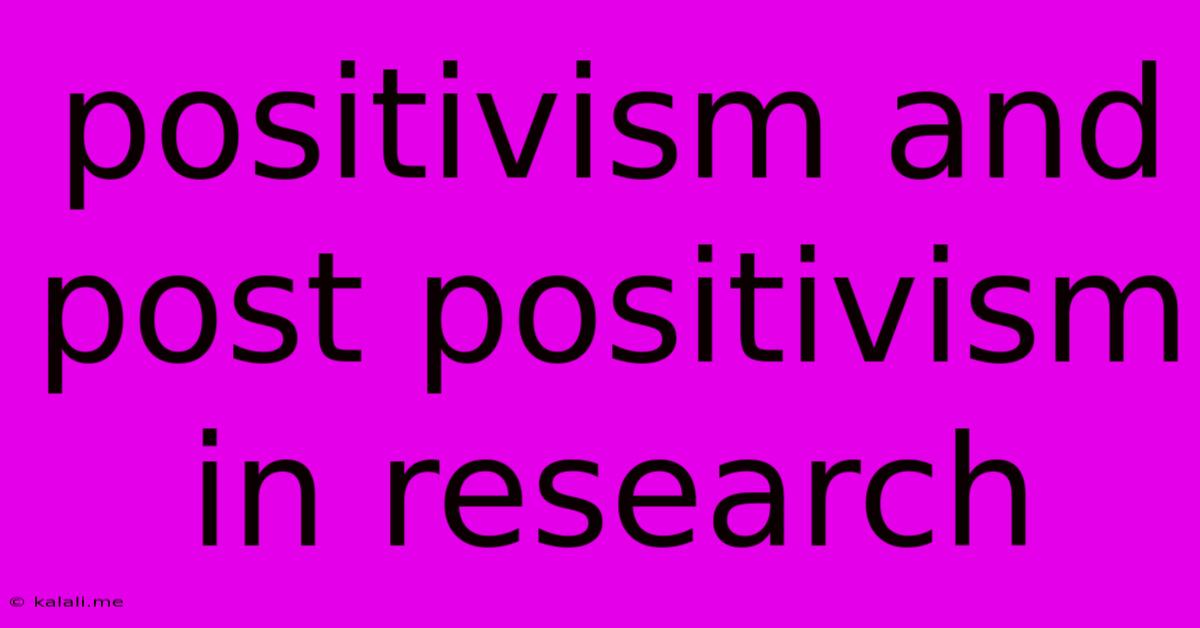Positivism And Post Positivism In Research
Kalali
Jun 13, 2025 · 4 min read

Table of Contents
Positivism and Post-positivism in Research: A Comprehensive Overview
Meta Description: This article explores the core tenets of positivism and post-positivism, two major philosophical approaches to research, highlighting their differences and implications for research design and methodology. Learn how these paradigms shape our understanding of knowledge and truth.
Understanding the philosophical underpinnings of your research is crucial for conducting rigorous and meaningful studies. Two dominant paradigms that shape research approaches are positivism and post-positivism. While both aim to generate knowledge, they differ significantly in their assumptions about reality, truth, and the researcher's role. This article will delve into these differences, clarifying the implications for research design and methodology.
Positivism: The Search for Objective Truth
Positivism, rooted in the Enlightenment era, emphasizes the importance of empirical evidence and objective observation in acquiring knowledge. It asserts that there's a single, objective reality that can be understood through scientific methods. Key tenets of positivism include:
- Objectivity: Researchers should strive for neutrality, minimizing personal biases and subjective interpretations. The goal is to uncover objective facts about the world.
- Quantitative Methods: Positivism favors quantitative methods like experiments, surveys, and statistical analysis, believing these methods yield objective and measurable data.
- Verification: Positivist research aims to verify existing theories or develop new ones based on empirical evidence. The focus is on testing hypotheses and establishing causal relationships.
- Generalizability: Findings from positivist research should ideally be generalizable to a larger population, implying that the observed relationships hold true beyond the specific study context.
- Value-Free Research: Positivists strive for value-free research, meaning personal values and beliefs should not influence the research process or interpretation of results.
Limitations of Positivism
Despite its contributions, positivism faces several criticisms:
- Ignoring Subjectivity: Critics argue that complete objectivity is unattainable, as researchers' perspectives inevitably shape the research process.
- Oversimplification of Reality: Reducing complex social phenomena to quantifiable variables can lead to an oversimplified and potentially misleading understanding of reality.
- Lack of Contextual Understanding: The emphasis on generalizability can neglect the specific contexts in which phenomena occur, leading to a lack of nuanced understanding.
Post-positivism: Acknowledging the Limits of Objectivity
Post-positivism emerged as a critique of positivism, acknowledging the limitations of achieving complete objectivity and the complexities of human experience. While it still values empirical evidence, it recognizes that our understanding of reality is always partial and influenced by our perspectives. Core principles of post-positivism include:
- Subjectivity Acknowledged: Post-positivists recognize that researchers' values and biases influence the research process, advocating for transparency and reflexivity.
- Interpretive Approaches: Post-positivism embraces both quantitative and qualitative methods, recognizing the value of interpretive approaches in understanding complex social phenomena. Qualitative research methods such as interviews and ethnography allow for a richer understanding of context and meaning.
- Falsification: Rather than solely focusing on verification, post-positivists emphasize falsification—attempting to disprove theories through rigorous testing.
- Multiple Realities: Post-positivism acknowledges that multiple perspectives and interpretations of reality may exist, emphasizing the importance of understanding these diverse viewpoints.
- Contextual Understanding: It places greater emphasis on understanding the context in which phenomena occur, recognizing that knowledge is context-dependent.
Post-Positivism in Practice
Post-positivist research often involves:
- Mixed Methods Research: Combining quantitative and qualitative methods to gain a more comprehensive understanding.
- Triangulation: Using multiple data sources and methods to corroborate findings and enhance validity.
- Reflexivity: Critically reflecting on one's own biases and how they might influence the research process.
Positivism vs. Post-positivism: A Comparison
| Feature | Positivism | Post-positivism |
|---|---|---|
| Ontology | Realist (one objective reality) | Realist but acknowledges limitations |
| Epistemology | Objectivist (knowledge is objective) | Subjectivist (knowledge is subjective) |
| Methodology | Primarily quantitative | Quantitative and qualitative |
| Goal | Verification of theories, prediction | Understanding, interpretation, explanation |
| Truth | Absolute and discoverable | Partial and constructed |
Conclusion
Both positivism and post-positivism offer valuable perspectives on conducting research. The choice of paradigm depends on the research question, the nature of the phenomenon being studied, and the researcher's philosophical stance. Understanding these paradigms allows researchers to make informed decisions about their research design, methods, and interpretation of findings, ultimately leading to more robust and meaningful contributions to knowledge. Choosing the appropriate paradigm is crucial for ensuring the validity and reliability of your research.
Latest Posts
Latest Posts
-
Common Factors For 84 And 105
Jun 14, 2025
-
Which Color Is Not A Primary Color
Jun 14, 2025
-
What Is The Difference Between A Square And Rhombus
Jun 14, 2025
-
The Normal Rbc Graveyard Is The Liver
Jun 14, 2025
-
Can You Reschedule A Sat Test
Jun 14, 2025
Related Post
Thank you for visiting our website which covers about Positivism And Post Positivism In Research . We hope the information provided has been useful to you. Feel free to contact us if you have any questions or need further assistance. See you next time and don't miss to bookmark.